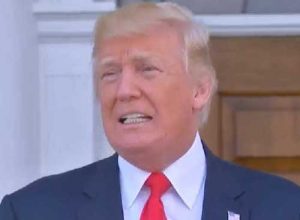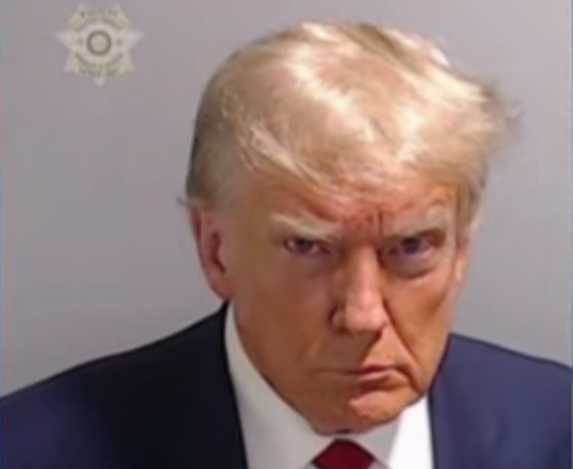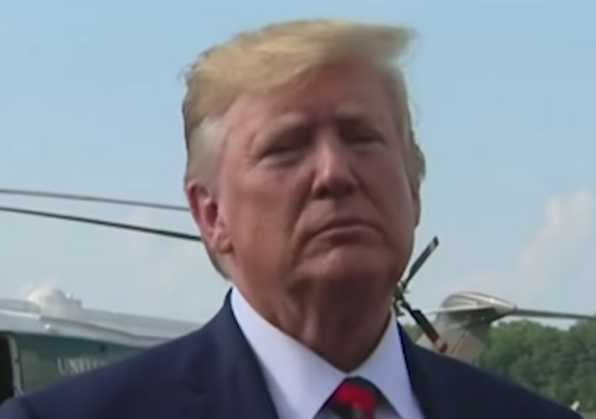
WASHINGTON — U.S. President Donald Trump’s new national security strategy will provide the country with a “clear and actionable playbook” to counter the most dangerous and persistent threats, according to senior administration officials.
Trump will roll out the strategic document Monday during a speech in Washington, almost 11 months after his administration began work on it.
Senior administration officials say unlike recent, past strategies, it takes a “clear-eyed view” of the dangers and challenges facing the country, while prioritizing U.S. interests in line with the president’s calls to put “America First.”
“The global balance of power has shifted in unfavorable manners to American interests,” a senior administration official said Sunday. “This new strategy presents a plan of how America can regain momentum to reverse many of these trends.”
“[It] that will really serve as a foundation for subsequent strategies,” the official added, alluding to soon to be released defense and counterterrorism documents.
Administration officials say despite their concerns, the new national security strategy is not meant as a repudiation of the strategies laid out by former President Barack Obama or even former President George W. Bush.
“We do live in a global competition and how we advance our goals is more critical than ever,” the senior administration official said. “We must compete.”
To better compete on the global stage, Trump administration officials are focusing on what they describe as four, vital national interests: protecting the homeland, promoting American prosperity, preserving peace through strength, and advancing American influence.
“We have to work together harder than ever to ensure that nations uphold the rule of law, respect the sovereignty of their neighbors and support the post-World War II, post-Cold War order of peace, stability and collective security,” White House National Security Adviser Gen. H.R. McMaster said while previewing the new strategy last week in Washington.
Confronting challengers
The strategy identifies three groups of challengers to that order, officials say.
The first group includes nations like Russia and China, which are seeking to create a new global order, both militarily and economically, that officials believe will hurt or hamper U.S. interests.
The second group of challengers are rogue regimes, like North Korea and Iran, which are pursuing weapons of mass destruction while also supporting terrorism and other destabilizing activities.
The final group includes transnational terrorist groups and crime syndicates.
Administration officials say the new national security strategy will confront these different challengers on the global stage.
“We vacated a lot of competitive space in recent years and created opportunities,” McMaster said. “You’ll see a big emphasis on competitive engagement.”
But exactly how the U.S. will do that remains a bit of a question.
“This document is more high-level and over-arching,” said a second senior administration official. “It doesn’t move country-by-country.”
Still, officials say elements of the new national security strategy are already evident in Washington’s approach to North Korea, Iran and South Asia.
It also seeks to push back against the notion that President Trump’s campaign rallying cry of “America first,” should be interpreted as “American alone.”
Instead, officials say the strategy will reaffirm the United States’ commitment to its allies. They also say it affirms the U.S. commitment to NATO and the United Nations, though they are clear that Trump believes reforms at both organizations are long overdue.
Nor will the U.S. rule out working with countries it sees as its top rivals, including China and Russia.
“The nature of competition doesn’t mean you don’t also cooperate,” said another senior administration official. “We talk about cooperation, about cooperation with reciprocity.”
For example, officials said the U.S. sees China as a key partner in the effort to rein-in North Korea’s aggression and nuclear ambitions, despite what they described as Beijing’s economic aggression toward the U.S.
Shared interests
Officials pointed to Sunday’s phone call between Russian President Vladimir Putin and President Trump, when Putin thanked the U.S. and the CIA for sharing intelligence to thwart a terror plot, as a “great example where there’s a shared interest.”
“We’ve seen some of that also this year in Syria against ISIS in deconfliction in trying to set up safe zones,” the official said.
“We’re certainly better off right now than we were several months ago when both the secretary of state and the president remarked that the [U.S.-Russia] relationship seemed to be at a low point,” the official added. “But we still see a lot of areas where our interests just don’t align or directly conflict.”
A prime area of conflict with Russia is over what McMaster, the president’s national security adviser, has called “sophisticated campaigns of subversion and disinformation.”
And an unclassified U.S. intelligence report released last January concluded Russian President Vladimir Putin waged what it described as an unprecedented “influence campaign” in an effort to sway the 2016 U.S. presidential election in favor of then-candidate Donald Trump.
Yet when asked, other senior administration officials would not say how the new National Security Strategy will address such concerns, saying other actors, including China and terror groups have also increasingly used such techniques.[xyz-ihs snippet=”adsense-body-ad”]There are also areas where the new national security strategy departs dramatically from the previous administration’s policies.
President Barack Obama’s 2015 National Security Strategy placed an emphasis on promoting and defending democracy and human rights.
The new Trump doctrine takes a different tact.
“We mention all the components of making a democracy: tolerance, liberty, freedom of religion,” said one of the senior administration officials. “But building on what local partners want so we’re not imposing our way of life, so we’re not imposing democracy.”
Obama’s 2105 strategy also called on the U.S. to confront “the urgent crisis of climate change.”
The Trump national security strategy does not.
“Climate change is not identified as national security threat,” said one of the officials. “The importance of the environment and environmental stewardship are discussed.”
The new national security strategy has already gotten the approval of key officials, including Defense Secretary Jim Mattis, Secretary of State Rex Tillerson and Treasury Secretary Steve Mnuchin, as well as Director of National Intelligence Dan Coats and CIA Director Mike Pompeo.
Source: VOA






